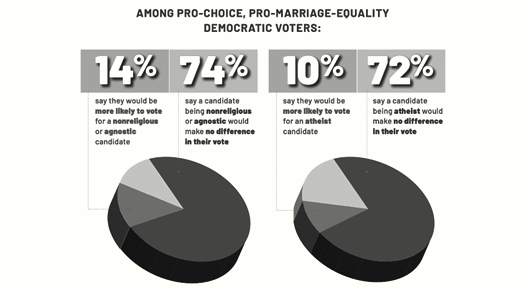
Photo Credit: Patheos
A new poll conducted by Lake Research Partners for the American Humanist Association and the Center for Freethought Equality found that “being non-religious or atheist need not be considered an impediment to a candidate’s electoral success.”
In 2012, there was cause for celebration simply because more than half of those surveyed said they would support an atheist candidate. In 2015, that number had jumped to 58% and there was a new low group on the totem pole: Socialists, who only had the support of 47% of voters. Now, we come to 2018 and, luckily, there is a positive change. Actually, among pro-choice, pro-marriage-equality democratic voters, 10% say they would be more likely to vote for an atheist candidate, while 72% say a candidate being atheist would make no difference in their vote.
As American Humanist Association stated, the results of the poll indicate that there is a growing preference for secular leaders, and that a majority of voters across every demographic prioritize other political concerns over issues of religious faith or lack thereof. Preference for religious candidates virtually disappears when voters consider the policy stances of a non-religious candidate. Seventy-two percent of poll respondents were willing to vote for a non-believer or non-religious candidate who shares their policy positions.
The report concludes:
Nontheistic, progressive Democrats in non-swing districts should no longer feel hesitant to be public about their religious identity. And while it still could be a challenging factor in swing districts, it’s no longer the taboo it once was.
“It’s heartening to see that the political bias against atheist and humanist candidates is disappearing,” says Roy Speckhardt, executive director of the American Humanist Association and the Center for Freethought Equality. Speckhardt continues, “This poll demonstrates that voters care more about a candidate’s policy stances, than his or her religious identification.”
Of course, results of the poll did vary by political party. Forty-eight percent of Republicans said they would be less likely to vote for an atheist candidate who shared their political positions. However, most younger Republicans (68% of those under 35 and 54% of those under 50) said that a candidate’s atheism would make no difference to them.
Ron Millar, Political and PAC Coordinator at the Center for Freethought Equality urges, “...the humanist, atheist, and agnostic community to be fully and openly engaged in our democratic process. Our political system depends on the active participation of all our citizens.”
